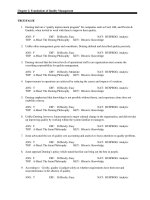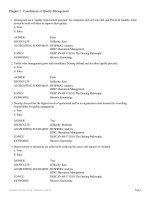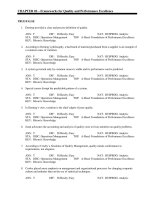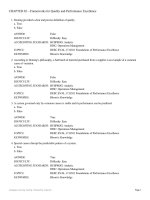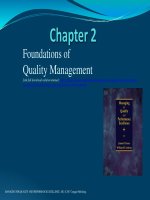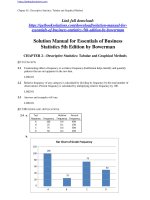Solution manual for quality and performance excellence 8th edition by evans
Bạn đang xem bản rút gọn của tài liệu. Xem và tải ngay bản đầy đủ của tài liệu tại đây (118.69 KB, 13 trang )
INSTRUCTOR'S NOTES TO ACCOMPANY
QUALITY AND PERFORMANCE EXCELLENCE: MANAGEMENT,
ORGANIZATIONAND STRATEGY, Eighth Edition
Solution Manual for Quality and Performance Excellence 8th Edition by Evans
James R. Evans
These notes are intended to provide guidance for discussion of the questions and cases at
the end of the chapters. Most questions have been purposely designed to be open-ended,
so there is no one correct answer. Rather, their purpose is to stimulate discussion and
make the concepts of total quality more personal to the student. Other questions are
designed to ensure that students have grasped the basic concepts in the chapter and are
basically review in nature.
Full file at />
Chapter 1: Introduction
Discussion Questions and Experiential Exercises
1. Describe how the specific practices of PVHS in the opening Performance
Excellence Profile support the principles of TQ.
Students should link their answers to Table 1.1.
Focus:and
diversified
services; Excellence
listening to customers
to improve
ER layout
Solution ManualCustomer
for Quality
Performance
8th Edition
by Evans
and patient rooms; Getwell Network
Leadership: high-performance culture; communication mechanisms
Involvement of People: interdisciplinary teams; open door policy
Process Approach: innovative systems and technologies
System Approach to Management: mission – to remain independent while providing
innovative, comprehensive care of the highest quality, and exceeding customer
expectations; vision – to provide world-class health care
Continual Improvement: performance improvement system called Global Path to
Success; action plans to address performance issues; innovation strategies
Factual Approach to Decision Making: Balanced Scorecard system; Meditech
Information System
Mutually Beneficial Supplier Relationships: partnering relationships
2. Explain why quality became the most important issue facing American
business in the 1980s. In addition to economic competition from Japan, what
other factors may have contributed to the importance that quality has
assumed?
Quality became an important business issue because of the fall of American
competitiveness in world markets, and particularly, the economic competition from
Japan and other Asian countries. During the preceding decades, American
manufacturers focused more on quantity of output rather than quality. As the rate of
quality improvement in Japan was faster than that in America, the overall quality of
goods produced in Japan exceeded those produced in the U.S. sometime during the
1970s. Other factors include increasingly quality-conscious consumers, rapid
advances in technology that required better attention to quality, and growing
realization that managers were focused on the wrong goals and objectives.
3. Examine the annual reports of one company over a period of years.
Summarize how quality is discussed or implied in the company’s statements
and philosophy. Are any changes in the perspectives of quality evident over
time?
Most annual reports will make reference to customers, improvement initiatives, and
so on, particularly in their mission statements. Many address quality issues directly.
Of course, this was more prevalent in the 1990s and early 2000s; however, many
aspects of quality, particularly those in Table 1.1 are often evident. Here is one
Full file at />
summary of John Deere & Co. Instructors might use this for discussion prior to
assigning this question and provide it as a template for students to follow.
•
In 1999, the themes of continuous improvement, profitable growth, and
business innovation continued to be dominant. The continuous improvement
area featured six sigma quality goals for performance and customer
satisfaction. It was mentioned that during the year some 900 projects
involving several thousand employees had been carried out. These six sigma
projects had the objectives of streamlining business processes, focusing on
customers, and structuring around core processes.
Solution Manual for Quality and Performance Excellence 8th Edition by Evans
•
In 2005, Deere employees were aligned with business objectives and
evaluated and compensated accordingly. Most salaried employees worldwide
followed detailed, tailored performance plans that spelled out how each
individual's efforts contribute to meeting unit and company goals. Also
stewardship of the environment was emphasized, pointing to how the
company developed product solutions that were less disruptive to the
surrounding environment, such as the John Deere 2500 E greens mower that
uses hybrid technology, resulting in lower noise, better fuel efficiency, and
plenty of power (18-hp); the Tier 3-compliant PowerTech Plus engines using
the latest technology to deliver better fuel economy and more power while
meeting stringent emissions regulations; and becoming the first equipment
manufacturer to use biodiesel as a factory fill at its U.S. manufacturing
locations.
•
In 2008, Deere emphasized four key approaches: rigorous processes, the
Deere Product Quality System, corporate responsibility, and an emphasis on a
performance-based work culture. Following rigorous processes everywhere
helped Deere address the growing scope and scale of operations and achieve
increased levels of consistency, simplicity, efficiency and quality. Many of
their approaches were unique to Deere and hard to copy. Concurrently, the
company implemented the Deere Product Quality System (DPQS), a set of
world-class manufacturing practices designed to meet rising customer
expectations for increased product reliability. Product lines responsible for
most of the company’s sales received advanced quality certification through
2008. Deere affirmed that it takes its responsibilities seriously. This included
continuing to set employee safety as one of John Deere’s top priorities, and
endeavoring to treat the environment with increasing care, by making
sustainability an integral part of its operations. Their biomass energy system
went into operation during the year at their German combine factory. Further
in 2008, Deere announced plans to reduce greenhouse gas emissions from its
global operations as part of participation in the U.S. Environmental Protection
Agency’s Climate Leaders program. Finally, John Deere established a
performance-based culture that features a employee teaming and
collaboration, promotes a global and inclusive work environment, and helps
the company strengthen its competitive advantage through the attraction and
retention of highly talented employees from all backgrounds.
Full file at />
•
In 2010, Deere took a more strategic business focus. Their strategy
concentrated on two growth areas – agricultural and construction equipment
solutions. Other operations – turf, forestry, parts, engines, intelligent
solutions, and financial services – were said to have vital roles supporting or
complementing the growth operations. Deere’s lineup of tightly knit
operations were designed to leverage strengths, optimize investments,
efficiently target leadership and employee resources, and extend its ability to
compete in the global marketplace. The company set goals that would result in
a near-doubling of sales, a healthy increase in profitability, and an almost
three-fold increase in economic profit, or SVA, by 2018. The strategic plan
targets roughly half of the company’s sales coming from outside the U.S. and
Solution Manual for Quality
and Performance Excellence 8th Edition by Evans
Canada by 2018, versus about one-third in 2010. Financial performance
measures were implemented to ensure that results would be sustainable as
Full file at />growth was being accelerated. Business “health” metrics were developed,
pertaining to product quality, market share and employee engagement, among
other areas.
•
In 2012, Deere continued their strategic business focus theme.
These summaries definitely show an increasing commitment to TQ concepts. The
early use of TQ concepts was actually started when Deere began to focus on TQ
concept in the 1990’s. Management has continually emphasized productivity and cost
reduction as the key to excellence. In the mature and very competitive heavy
equipment industry, the changing focus on human resource practices and stewardship
of the environment in 2008, 2010, and 2012 signaled that cost reduction, quality
improvement and "value to the customer" may be defined in a different way that will
convey an updated image to the average buyer. Also, there seems to be increasing and
sustained interest in promoting and supporting citizenship efforts, which is sometimes
called corporate social responsibility. For the latest Deere annual report, go to:
.
4. Conduct some research on quality practices that is focused on a particular
country or global region. Summarize your findings in a two- to three-page
report.
Quality has become central to many countries and regions around the world. For
example, the European region has it’s own version of the Baldrige Award, the
European Foundation for Quality Management; European countries also use ISO
9000 extensively. Much can be found about China and other emerging and
developing companies. What students should discover are the challenges or benefits
that many countries face in regards to quality, and possibly some differences in
culture that make their quality efforts different from those in the U.S.
5. Cite several examples in your own experience in which your expectations
were met, exceeded, or not met in purchasing goods or services. How did you
regard the company after your experience?
Full file at />
Everyone has had such experiences. Getting students to share these provides a better
sense of how consumers define quality. This question can be used to develop and
discuss alternative viewpoints and definitions of quality.
6. How might the definition of quality apply to your college or university?
Provide examples of who some customers are and how their expectations can
be met or exceeded.
Schools are ripe for quality improvement. Students and faculty have many examples.
It is also important to note that viewpoints differ at different levels; for example, in
classroom, within a specific college, an in the university as a whole. Much
Solution Manualthe
for
Quality and Performance Excellence 8th Edition by Evans
controversy exists about who are the customers of a school. This discussion leads
easily to conflicting needs and objectives and raises questions about how customers'
Full file at />needs can be satisfied. You might wish to investigate Baldrige education winners.
Application summaries are generally available on Baldrige winners’ web sites. Start
at www.nist.gov/baldrige and click the link for Award Recipients.
7. High quality is not necessarily related to price. Discuss this, drawing from
your own knowledge and experience, and provide examples where this may
and may not be true. High quality is not necessarily related to price. Discuss
this, drawing from your own knowledge and experience, and provide
examples where this may and may not be true.
Most people, whether rich or poor, exhibit some sense of being value-conscious in
defining quality. They look for bargains where they can get more, and/or spend less,
than they had expected for a similar good or service. Thus they want to obtain the
“biggest bang for their buck,” whether buying a luxury SUV or an economy subcompact car. Either or both of those can be bargains if they are designed and built
with quality, have the features that the customers are looking for, are priced
competitively, and are fit for intended use. Students can and should be able to cite
situations in which they have found a quality product at a bargain price, and situations
in which they did NOT receive a bargain, despite a very low or very high cost of the
product. However, researchers have found that one cannot determine quality from
price alone. One can find very good wines, for example, at a low price point. Other
examples, are store-branded merchandise compared with national brands.
8. Discuss how the frequency with which you anticipate using a product might
impact the quality and price that you are willing to pay and how it relates to
the value-based definition. Provide some examples to justify your reasoning.
The more that one uses a product might influence one to pay higher prices for higher
quality, thinking in terms of total cost of ownership and long term durability and
reliability. Thus one might place higher value on a product that has more reliability.
Similarly, one might not purchase the highest quality product that one might use
infrequently. A simple example is a step ladder. A homeowner who might use one
only a few times a year might not purchase a high price, high quality ladder, whereas
a contractor that would use one on a daily basis might. Students should be able to
suggest some relevant examples.
Full file at />
9. What implications do you think the forces that will influence the future of
quality (see the box “What Will Influence the Future of Quality” in the
chapter) will have on management practice?
Students should try to develop ideas on how these trends will change management
behavior; for example, how social media is changing the way that quality influences
organizational management. As another example, global responsibility and
environmental concerns are reflected by the current focus on sustainability and
environmental protection; students can discuss issues of global warming as it relates
process design, recyclability as it relates to product design, and so on. A good
Solution Manualto
for
Quality and Performance Excellence 8th Edition by Evans
exercise would be to ask students to create a matrix where the rows are the forces and
columns are functional management decision areas such as OM (perhaps broken
Full file at />down by product/service design, supply chains, etc.), marketing, finance, and so on,
and to identify management practices that might be changed as a result of these
factors.
10. How has social media changed how both consumers and organizations deal
with quality? How can organizations exploit social media in their quality
approaches and decisions?
The ability to rapidly exchange and share opinions makes it easier for consumers to
identify both good and poor goods and services (e.g. the United Breaks Guitars
example). A quick search on a smart phone can change a potential purchase to a lost
customer. Organizations can also “mine” an immense amount of data and learn about
customer behaviors, likes, and dislikes quite easily.
11. Think of a product with which you are familiar. Describe the eight “multiple
quality dimensions” (e.g, performance, features, and so on) for this product
that are listed in this chapter.
This question is designed to get students to think about the different dimensions. The
results can be used to prioritize needs (as a good lead-in to QFD or the development
of customer survey questionnaires, for instance).
12. What might the eight “multiple quality dimensions” mean for a college or
university? For a classroom?
This enables students to apply the concepts to something they all know about and in
which they have a vested interest. A key issue is what are the "products" and services
a school provides.
13. Explain the differences between manufacturing and service organizations
and their implications for quality.
Most students would probably have seen this in an introductory operations
management course. These differences include higher labor intensity, immediate
consumption and lack of storage of the "product," generally a higher degree of
Full file at />
customization, a large volume of transactions, time sensitivity, and an increased
reliance on the human element. The quality dimensions important to customers are
different; thus, quality efforts are also different. Key issues are described in the
chapter in the Quality in Services section.
Solution
14. A car rental agency surveys its customers on the following characteristics:
• Cleanliness of the rental facility
• Courtesy of staff
• Efficiency of vehicle pickup/return
• Cleanliness of vehicle
• Professionalism of staff in explaining the contract and options
Manual for
Quality and Performance Excellence 8th Edition by Evans
How would you classify each of these according to the five key service quality
dimensions? What dimensions are missing?
Full file at />•
•
•
•
•
Cleanliness of the rental facility - tangibles
Courtesy of staff - assurance
Efficiency of vehicle pickup/return - reliability
Cleanliness of vehicle - reliability
Professionalism of staff in explaining the contract and options - assurance
None of these dimensions address empathy or responsiveness.
15. Describe the key principles of total quality.
Students should be able to list and explain the concepts in Table 1.1.
16. How might you apply the concepts of TQ to your personal life? Consider
your relations with others and your daily activities such as being a student,
belonging to a fraternity or professional organization, and so on.
Students should consider issues such as Who is my customer? How do I plan to be a
"quality person"? What do I do to continuously improve? (Good examples include
class preparation and interpersonal relations.) The instructor may wish to consult
some of the writings of Harry Roberts, such as "Using Personal Quality Checklists" in
Quality Progress, June 1993, p. 51, or Harry Forsha, The Pursuit of Quality Through
Personal Change, Milwaukee: American Society for Quality Control, 1992. Many
articles in Quality Progress over the last few years have dealt with these issues. ASQ
has a nice search engine. Go to www.asq.org and select the Publications link.
17. Why is a customer focus a critical element of a high-performing
organization?
Customers are the judges of quality. No customers, no sales, no jobs. Simple idea,
but awfully difficult for many organizations to see and implement.
18. Make a list of your personal “customers.” What steps might you take to
understand their needs and build customer engagement?
Full file at />
This question is designed to make quality more personal -- parents, spouses,
roommates, teachers, etc. The instructor might try to relate these personal issues to
those of a company like Coca-Cola.
19. Cite an example in which you did not purchase a product or service because
it lacked “dissatisfiers” as defined in the chapter. Cite another example in
which you received some “exciters/delighters” that you did not expect.
Solution
This question is similar to #3, but focused on products. It will help elicit key
dimensions that customers want and help students realize the necessity of both
customer expectations and trying to anticipate and exceed them. The
Manualmeeting
for Quality
and Performance Excellence 8th Edition by Evans
instructor might comment that one of the goals of the course is to transform students
into "customers from hell."
Full file at />
20. In what ways might the lack of top management leadership in a quality effort
hinder or destroy it?
Top management has the ultimate responsibility for instilling quality among their
employees. Role models are powerful influences. All talk and no action can easily
kill a quality program. These issues are discussed in the Strategic Planning and
Leadership subsection.
21. Explain the various areas within an organization in which continuous
improvement and learning may take place.
Everywhere! Product design, manufacturing, engineering support, sales, etc. It is
easy to establish the importance of every activity in a company in meeting both
internal and external customer needs. No activity is immune to continuous
improvement, and the students should be encouraged to provide many examples.
22. Why is measurement important in an organization pursuing performance
excellence?
Problem solving should be based on objective data and facts. Measures are needed to
understand the problems and opportunities for improvement and for monitoring
progress. Many executives have stated that "you can't manage what you can't
measure," although Deming rejects this statement, stating that "the most important
figures are unknown or unknowable." These two points of view can be made as a
basis for class discussion and debate.
23. Examine some process with which you are familiar. Make a list of ways that
the process can be measured and improved. What difficulties might you face
in implementing these ideas?
Students should be encouraged to select simple processes with which they are very
familiar and understand well. This question can lead to how to describe a process
(see Chapter 3 on tools). Key issues that should be addressed are what measurements
to take. Many organizations fail in this regard, taking unnecessary measurements that
Full file at />
are useless for decision making, or failing to take critical measurements that address
customer needs. One way of approaching this is by a QFD-type matrix, listing
customer needs on the rows and measurements on the columns. An assessment of
how well the measures address customer needs will allow you to choose the right
ones or determine if any important ones are missing.
24. Describe the three ways of viewing teamwork.
Vertical, horizontal, and inter-organizational. See discussion in the Empowerment
and Teamwork subsection.
Solution Manual25.for
Quality and Performance Excellence 8th Edition by Evans
Describe some possible ways in which vertical, horizontal, and interorganizational teamwork can be applied at a college or university.
Full file at />
This will help students better understand the differences among the three types. How
much teamwork in a university involves its customers and suppliers, or cuts across
colleges and departments, or engages two-year as well as four-year programs? If
your school is typical, the answer is probably obvious. It is easy to brainstorm many
opportunities.
26. What is employee engagement? How does it differ from empowerment? How
might an employee really know that he or she is truly empowered? How
might an organization know that employees are truly engaged?
Employee engagement simply means that workers have a strong emotional bond to
their organization, are actively involved in and committed to their work, feel that their
jobs are important, know that their opinions and ideas have value, and often go
beyond their immediate job responsibilities for the good of the organization.
Empowerment is giving people the authority and responsibility to make decisions that
affect the welfare of their customers. Indicators of empowerment include the
freedom to take risks, lack of bureaucratic red tape, management actions and defense
of employee decisions, management through leadership instead of control, financial
support, etc. Engagement is manifest in doing things without being asked or directed,
volunteering suggestions for improvement, willingly helping co-workers, and so on.
27. Have you ever felt restricted in your work because of a lack of
empowerment? Can you cite any experiences in which you noticed a lack of
empowerment in a person who was serving you? Why is this such a difficult
concept to implement in organizations?
Most students have had this experience, particularly in part-time or summer jobs.
How about as a student? How much empowerment do instructors typically give
students? (How much do you?) Inhibitors include a lack of trust, fear of
relinquishing control, and the reward system itself.
28. How does TQ differ from agency theory?
As discussed in the section in the chapter, agency theory takes a rather sterile
Full file at />
approach to organizational theory and removes people from the system. Differences
include how people are motivated, alignment of goals, sharing information, time
perspective, risk taking, and role of leadership. We have never heard a top executive
– especially from Baldrige winning organizations – state that people are not the key to
their success. Indeed, what we have observed is simply that successful organizations
go to great lengths to treat their employees as valued people.
29. Explain the mechanistic, organismic, and cultural models of organizations,
and how TQ is similar to or different from them.
1.2 and its associated discussion for a summary of the differences and
Solution ManualSee
forTable
Quality
and Performance Excellence 8th Edition by Evans
similarities.
Full file at />30. Today, both manufacturing and service depend greatly on information
technology and the Internet. What would be some ways of evaluating the
quality of a Web site?
Content that is intuitive and understandable, accurate, and current. This means that
the design of the site must meet the customers’ requirements, not the company’s. The
web site must be easy to navigate and locate information (such as ways to contact the
company!). If customers misinterpret information and make a wrong purchase,
expect returned products and non-returning customers. Product offerings and price
data change quickly, and need to be kept accurate and current. One of the author’s
unfortunate experiences involved purchasing an accessory listed as compatible with a
PDA only to find out that it didn’t work, leading to wasted time getting a return
authorization, repackaging, and returning the product (the Web site was corrected a
few weeks later). Technical issues might include the speed and reliability of the web
site, as reflected by page loading rates, and the number of clicks required to navigate
through the site, and server uptime/downtime.
CASES
The Reservation Nightmare
1. Summarize the service failures associated with this experience.
Basically, everything the company did was a service failure, from the complexity of
the menu, excessive wait time, repeating the 19-digit customer service number, and
transfer to another operator without response.
2. What might the travel agency have done to guarantee a better service
experience for Mr. Harrington? How do your suggestions relate to the TQ
principles?
Students usually identify numerous improvements including simplifying the
messaging system, better staffing, cross-training operators, and so on. The company
needs to better understand customer requirements (How long of a wait is acceptable?
Full file at />
How complex system do customers tolerate?), improve its processes (eliminate
redundancy, tie the 19-digit input to the operator’s computer), use data better
(determine how many customers use each feature, for example), and empower and
train employees to be able to answer a wider variety of questions.
Nashville Custom Guitars
Based on this tour of NCG, can you identify how the operations and quality
practices reflect the principles of TQ?
Solution Manual for Quality and Performance Excellence 8th Edition by Evans
(1) customer and stakeholder focus – attention to detail and perfect tone; handmaking necks to customer specifications; adjustments to optimize feel and playability
Full file at />
(2) a process orientation supported by continuous improvement and learning –
manufacturing layout and inspection activities; detailed process requirements (such as
humidity control and use of CNC machining for critical dimensionality)
(3) employee engagement and teamwork – small staff of experienced and empowered
luthiers who provide personal attention and hand-crafting of the guitars; recruiting
luthiers who want to work in a team environment and have a passion for guitar
making; encouraging workers to enhance their skills
(4) management by fact – luthiers recording what they did while building tops and
using the records to duplicate outstanding results
(5) a strategic focus on quality as a source of competitive advantage – small scale
operation with a focus on high quality; web page where owners can ask questions
(6) visionary leadership that views performance excellence as an integrated system –
lack of a formal quality department so that quality is understood to be everyone’s job;
encouraging training and even encouraging workers to open their own businesses.
Bishop’s Seafood (Note: this case also appears in Chapter 6; instructors may wish to
use it in the context of this chapter instead.)
1. Why do you think the restaurant went to such lengths in response to Sandy’s
call?
The restaurant went to great lengths in response to Sandy’s call because the last thing
that a high quality restaurant wants is any hint of food contamination. This is the
prime source of such a restaurant’s reputation. Customer satisfaction, loyalty, and
word-of-mouth advertising depend on the quality of their food.
2. How does this experience illustrate the five customer service dimensions:
tangibles, reliability, responsiveness, assurance, and empathy?
This experience illustrates the five customer service dimensions: tangibles, reliability,
Full file at />
responsiveness, assurance, and empathy? Tangibles were shown in where the hostess
seated the family. Reliability was shown in taking care to refill water glasses,
bringing the dishes for the meal out at one time, and later follow-up from the
corporate office representative. Responsiveness and empathy seemed to go hand-inhand as the needs of the children were met in the ordering part of the process, and
when the meal was taken back for warming on behalf of the friend who was arriving
late. Assurance was shown by the fact that management sent a food inspector to
ensure that there was no health problem present at the restaurant. The unexpected
sending of the $200 gift certificate seemed to illustrate all of the customer service
dimensions in one.
Solution Manual
for Quality and Performance Excellence 8th Edition by Evans
Patterson Auto Sales and Service
Full file at />Drawing upon the principles of TQ and the unique nature of services, describe
some of the issues that Bill must consider in achieving his vision. Develop a list of
action plans that he might consider.
Bill should examine each of the quality management principles in Table 1.1 and
consider their implications in the business. He must also consider the differences
between service and manufacturing:
•
•
•
•
•
•
•
Customer needs and performance standards are often difficult to identify and
measure in services, primarily because the customers define what they are and
each customer is different.
The production of services usually requires a higher degree of customization,
so employees must tailor their services to individual customers
The output of many service systems is intangible, so service quality can only
be assessed against customers’ subjective, nebulous expectations and past
experiences. (What is a “good” sales experience?)
Services are produced and consumed simultaneously, and many services must
be performed at the convenience of the customer. Attention must be paid to
training and building quality into the service as a means of quality assurance.
Customers often are involved in the service process and are present while it is
being performed, or at least, in specifying their problems and needs prior to
work being done on their car.
Services are generally labor intensive, and the quality of human interaction is
a vital factor for services that involve human contact. Thus, the behavior and
morale of service employees is critical in delivering a quality service
experience.
Many service organizations must handle large numbers of customer
transactions. Such large volumes increase the opportunity for error.
Action plans that Bill might consider developing must tailor the systems to the needs
of various types of customers. He must ensure that he develops appropriate
infrastructure, practices and tools to support his vision. For example, car buyers have
different needs from those who are coming in for shop service to their cars. For car
buyers to be able to obtain a wide range of vehicles and options to evaluate, have
Full file at />
access to available salespeople, enjoy a prompt greeting, and feel comfortable and unpressured in reaching a buying decision, Bill must plan on exercising leadership and
strategic planning to develop the required infrastructure. Because customers expect
salespeople to be courteous, to be knowledgeable about the cars, to respect their time,
and to honor verbal promises, courteous salespeople must be hired and trained to
support customer relationship management, develop good processes, and work to
improve systems through information and knowledge management.
For repair and maintenance service, customers want to have the work explained
appropriately, to be fully informed of any additional necessary work, and to have all
completion. They want good time estimates and communications
Solution Manualwork
for reviewed
Qualityon
and
Performance Excellence 8th Edition by Evans
with the service department. Thus repair service people must not only be technically
proficient, but also be customer focused, and understand and support the need for
Full file at />continuous improvement through information and knowledge management.
He should use the “effective practices” that are described for each principle in this
chapter and apply them to his business.
Full file at />
